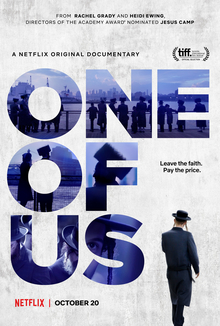| One of Us | |
|---|---|
 Film poster | |
| Directed by | Heidi Ewing Rachel Grady [1] |
| Produced by | Heidi Ewing Rachel Grady |
| Cinematography | Jenni Morello Alex Takats |
| Edited by | J. D. Marlow Enat Sidi |
| Music by | T. Griffin |
Production company | Loki Films |
| Distributed by | Netflix |
Release date |
|
Running time | 95 minutes |
| Country | United States |
| Languages | English Yiddish |
One of Us is a 2017 documentary feature film that chronicles the lives of three ex-Hasidic Jews from Brooklyn. The film was directed by Heidi Ewing and Rachel Grady, who also created the documentary Jesus Camp . [2] One of Us opened at the Toronto International Film Festival in September 2017, [3] and was distributed the following month of October via Netflix, which also financed the film. [4] [5]